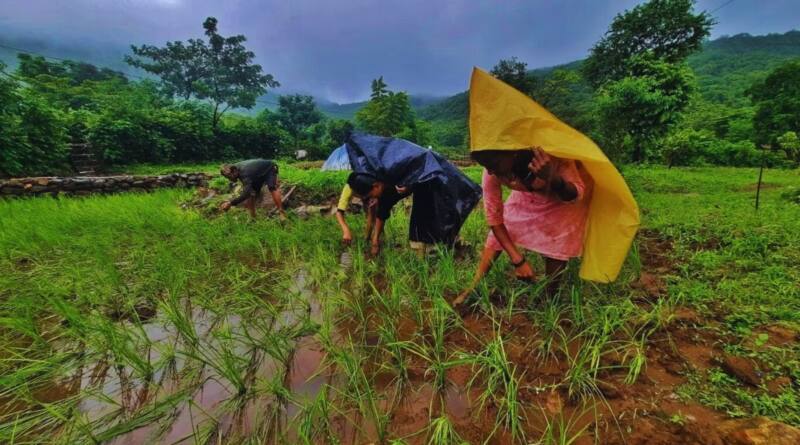Farming as Part of New India’s Culture and Civilization
During a famine, he could plough the field himself because he did not distinguish between rulers and ruled. One day, Raja Janak was farming in his empire’s field when he discovered a baby girl. Because she was discovered while farming in the field, the girl was named Sita, and she eventually married Lord Rama.
Haryana, also known as India’s breadbasket, is a place where farming is mentioned in ancient religious texts. According to the Vamana Purana, King Kuru ploughed the field of Kurukshetra with a golden ploughshare drawn by Lord Shiva’s Nandi bull, reclaiming seven Kosas. Sankarshana Balrama, Lord Krishna’s elder brother, is depicted carrying a plough on a coin of Graeco-Bactrian King Agathocles I Dicaeus. He is also the Hindu deity who represents farmers. There are several stories in Indian scriptures that highlight the importance of farming for Indians in various parts of this civilizational state, ranging from Raja Janak to Lal Bahadur Shastri’s slogan, “Jai Jawan Jai Kisan.” Farming is more than just a job for Indians; it is a part of our culture, from religious texts to Bollywood.
As we navigate the complexities of modern life, we must recognise and appreciate the unwavering dedication of these unsung heroes who serve as the backbone of our country. The agricultural sector serves as the foundation for our society’s prosperity. Farmers work in fields that produce the fruits, vegetables, and grains that feed us. They are the earth’s custodians, ensuring the survival and sustenance of communities across our country. Farmers play a critical role in ensuring food security, which is the foundation of any thriving nation. Their tireless efforts to sow, nurture, and harvest crops contribute to the abundance of the food supply chain.
Farmers are more than just food providers; they are also our country’s economic backbone. Agriculture accounts for a sizable portion of the country’s GDP, and millions of people rely on it for a living. The agricultural sector’s prosperity has an impact on markets, trade, and employment. To strengthen our nation’s backbone, we must provide strong support systems. Access to modern agricultural technologies, financial assistance, insurance coverage, and educational resources are all essential components of this support. Policies that empower farmers, protect their interests, and guarantee fair prices for their produce are critical to fostering a sustainable agricultural sector. Farmers, because of their close connection to the land, are environmental stewards. When adopted, their sustainable practices result in harmonious coexistence with nature. Farmers demonstrate a deep understanding of the delicate balance between agriculture and ecology through methods such as organic farming and water conservation initiatives.
While we recognise farmers’ important role, we must also acknowledge the challenges they face. Farmers face formidable challenges such as unpredictable weather patterns, market fluctuations, and limited access to resources. Addressing these challenges requires a collaborative effort from the government, society, and farmers themselves. In India’s diverse agricultural landscape, state governments play a critical role in launching development initiatives and ensuring farmer well-being. While agriculture is a state subject, the Government of India supplements these efforts with strong policy measures, budgetary support, and a slew of programmes. A significant increase in budget allocations for the Ministry of Agriculture and Farmer Welfare demonstrates the country’s commitment to improving the agricultural sector.
The government has implemented a number of schemes and programmes aimed at improving farmers’ well-being, increasing output, and ensuring remunerative returns. These initiatives include the PM-KISAN income support scheme, the Pradhan Mantri Fasal Bima Yojana (PMFBY), institutional credit for agriculture, establishing Minimum Support Prices (MSP), promoting organic farming, and initiatives such as Per Drop More Crop.
The PM-KISAN scheme, launched in 2019, provides farmers with an annual income support of ₹6,000. As of November 30, 2023, more than 11 crore farmers had received over ₹2.81 lakh crore in payments. Since its inception in 2016, the PMFBY has enrolled 49.44 crore farmer applications and generated over ₹1,46,664 crore in claims, benefiting over 14.06 crore farmers.
Institutional credit for agriculture has significantly increased, from ₹7.3 lakh crore in 2013-14 to ₹21.55 lakh crore in 2022–23. Ensuring access to credit allows farmers to invest in modern technologies and effectively deal with challenges.
The Per Drop More Crop (PDMC) programme, launched in 2015-16, aims to improve water use efficiency and productivity through micro-irrigation technologies. This scheme covers over 81.87 lakh hectares with a central assistance release of ₹18,893.74 crore.
Agricultural mechanisation is critical for modernising farming operations and reducing drudgery. Over ₹6,405.55 crore has been allocated for agricultural mechanisation, including subsidies for 15,23,650 machines and equipment for farmers. The establishment of customs hiring centres and farm machinery banks provides additional support to farmers.
The creation of 10,000 new Farmer Producer Organisations (FPOs) with a budget of ₹6,865 crore aims to enhance farmers’ collective bargaining power. A thriving start-up ecosystem with ₹83.67 crore in grants-in-aid has been established to promote innovation in agriculture and related sectors.
India’s agricultural and allied exports have grown significantly, reaching $50.24 billion in 2021–22. Furthermore, DARE schemes implemented under the ministry of agriculture and farmer welfare have resulted in remarkable success stories, helping farmers increase their income.
The government’s comprehensive measures demonstrate its commitment to the overall development of agriculture and the well-being of farmers. From income support schemes to technological innovations, the initiatives seek to empower farmers and ensure Indian agriculture’s long-term viability and prosperity. As the country moves towards self-sufficiency, the transformative impact on farmers’ lives demonstrates the success of these initiatives.




